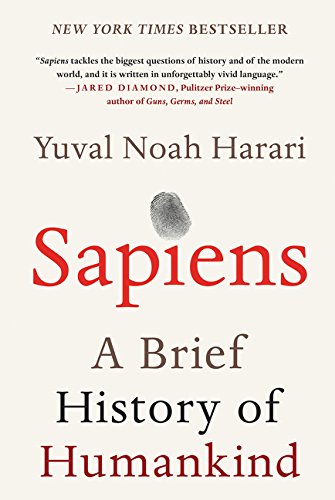By Yuval Noah Harari (2011)
Pages: 443, Final verdict: Must-read
How did our species come to dominate the world? What were the decisive factors that turned insignificant descendants of apes into an intelligent and social species capable of travelling to faraway lands, assert its dominance worldwide, and even adventure into outer space?
In a remarkable journey over the past 100 000 years, Dr. Yuval Noah Harari, a professor of History at the Hebrew University of Jerusalem, explores the biological, social and environmental factors that shaped the rise and dominance of the Homo Sapiens.
From the savannah to the moon
We hardly ever stop to think about how our lives came to be the way they are. Why are we, humans, the ruling species of our planet? We are certainly not the strongest, fastest or more flexible animal on Earth. Any trip to the local zoo or National Geographic TV show can tell us that.
In Sapiens, Harari sets himself the challenge of telling the history of Homo sapiens (Latin for “wise person”) in a comprehensive journey from the plains of East Africa to frantic cities of our countries.
And while we might think that our species has been ruling our planet since our inception, the reality tells us a different story. In fact, as Harari writes, “ the most important thing to know about prehistoric humans, is that they were insignificant animals with no more impact on their environment than gorillas, fireflies or jellyfish.” In fact, it was only about 70k years ago that our ancestors started developing the social skills that brought us to the top of the food chain. And this is where our the book really comes to life.
The essence of Sapiens revolves around 3 major revolutions and their impact on our development as a species:
-
The cognitive revolution, that took place 70k years ago. Here, the former insignificant humans living in the East Africa savannah started their consolidation of the human species. We developed the ability to communicate through language and form large societal groups, which in turn overtook other human species (e.g the Neandertals), beginning the assertion of our dominance on Earth.
-
The agricultural revolution that happened about 12 000 years marked our transition from hunter-gatherer societies to agriculture settlements. This revolution saw the first establishment of hierarchical classes, an exponential growth in population and the invention of numbers and mathematics. Still, Harari argues, this revolution was actually a step back in our quality of life, as humans started working longer hours, be more subjected to illnesses that rose from its crops and vulnerable to the external conditions that determined the quality of the land produce.
-
The scientific Revolution of 500 years ago. Finally, Harari covers the scientific revolution that began in Europe in the 1500s. This period saw deep transformation on our perception of mathematics, physics, astronomy and biology, lead by the likes of Francis Bacons, Galileo and Isaac Newton.
After reading dozens of incredible stories, inventions and evolutionary events that cause the rise of the Homo Sapiens, this is the main insight that I got from the book: what propelled us to the hegemony of the animal kingdom boils down to the fact that we, by the development of our large brains and societal skills, "are the only animals that can cooperate both flexible and in very large numbers”.
And unlike the gorillas of the savannah or worker bees in colonies, we are able to create and believe in fictional stories that bind us together to create functional and thriving societies. Nationalism, money, capitalism, religion, or human rights are all examples of such stories. While other animals can only describe reality, we have an uncanny ability to create it.
“You could never convince a monkey to give you a banana by promising him limitless bananas after death in monkey heaven.” - Yuval Noah Harari
Bottom Line
Sapiens is one of those books everyone should read. Entitled "a short history of mankind", it tells a wonderful story of our species and how we came to be the dominant force of our planet. It is also thought provocative, putting into question the dogmas of religion, happiness and many other aspects of our lives.
Still, it is worth noting that, particularly in what portrays the events of the cognitive and agricultural revolution, many of the theories presented lack of the type of solid evidence that exists for many other aspects of our history.
For me, having experienced Sapiens as an audiobook, this turned out to be one of the hardest reviews I've done. But however, you do it - by reading, hearing or seeing it - I'm sure you won't be disappointed by this recollection of the history of our species. In fact, you will be ever more "sapien" than when you started.



